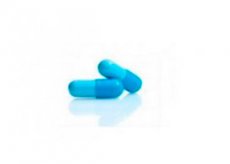Medical expert of the article
New publications
Preparations
Fix
Last reviewed: 04.07.2025

All iLive content is medically reviewed or fact checked to ensure as much factual accuracy as possible.
We have strict sourcing guidelines and only link to reputable media sites, academic research institutions and, whenever possible, medically peer reviewed studies. Note that the numbers in parentheses ([1], [2], etc.) are clickable links to these studies.
If you feel that any of our content is inaccurate, out-of-date, or otherwise questionable, please select it and press Ctrl + Enter.

Fix is an antibacterial drug that is used systemically. The drug belongs to the group of 3rd generation cephalosporins.
The principle of the therapeutic effect of the drug develops through the expressed suppression of the processes of binding of bacterial cell walls. The drug has a strong bactericidal activity. At the same time, it demonstrates resistance to the activity of β-lactamases, which are produced by a large number of bacteria (gram-negative, as well as -positive nature).
Indications Fixa
It is used in case of development of pathologies of infectious and inflammatory nature, provoked by the action of microbes sensitive to cefixime:
- lesions of the upper respiratory tract (including sinusitis with pharyngitis and otitis media with tonsillitis);
- infections of the lower respiratory tract (bronchitis in the active or chronic phase, pleurisy and pneumonia of atypical or bacterial nature);
- lesions of bones, subcutaneous tissues and epidermis (impetigo, erysipelas, folliculitis, infectious wound lesions and furunculosis);
- disorders associated with the biliary tract (cholecystitis or cholangitis);
- infections of the urogenital tract (pyelonephritis, prostatitis with cystitis, gonorrhea or endometritis);
- typhoid fever or infections affecting the intestines.
Also used for scarlet fever or cystic fibrosis.
Release form
The drug is released in capsules - 4 or 10 pieces per pack.
Pharmacodynamics
The drug demonstrates high efficiency against gram-negative (Haemophilus influenzae, Proteus mirabilis, Gonococcus with Moraxella catarrhalis, Haemophilus parainfluenzae, Klebsiella oxytoca and Escherichia coli, as well as Proteus vulgaris, Pasteurella multocida, Klebsiella pneumoniae, Citrobacter diversus, Salmonella, Providencia, Serratia marcescens, Shigella and Citrobacter amalonaticus) and -positive microbes (streptococci).
Resistance to drugs is shown by Listeria monocytogenes, staphylococci, pseudomonads, clostridia with enterococci of subgroup D, Bacteroides fragilis and Enterobacter.
Pharmacokinetics
When using the drug, absorption occurs inside the gastrointestinal tract. The level of bioavailability is approximately 50%. Serum Cmax values are noted after 3-4 hours from the moment of administration. The half-life of the drug depends on the dosage size and is approximately 3-4 hours.
About 50% of the dose is excreted unchanged in the urine, and another 30% is excreted in the intestines along with bile.
Dosing and administration
Teenagers over 12 years of age (weight over 50 kg) and adults on average should take 0.4 g of the substance once a day (or 0.2 g 2 times a day). No more than 0.4 g of the drug is allowed per day. The therapeutic cycle lasts on average 1-2 weeks.
The portion size for people with SCF values in the range of <50/>10 ml per minute is equal to 0.3 g per day in 2 doses with a 12-hour interval (first 0.2 g of the drug is taken, and after 12 hours - another 0.1 g).
Individuals with a SCF level of <10 ml per minute should take 0.2 g per day in 2 doses with a 12-hour break (0.1 g each).
The capsules are swallowed without chewing, washed down with plain water.
Use Fixa during pregnancy
Pregnant women are prescribed Fix only if there are strict indications, when the probable benefit to the woman is more expected than the risks of consequences for the fetus.
It is forbidden to use the medicine while breastfeeding. You should stop breastfeeding during the period of taking the medicine.
Side effects Fixa
Main side effects:
- symptoms related to the liver and gastrointestinal tract: nausea, dry mouth, pain affecting the epigastrium, anorexia, diarrhea, vomiting, and in addition, jaundice with cholestasis, transient increase in liver transaminase activity, dysbacteriosis, hyperbilirubinemia and candidiasis affecting the gastrointestinal tract. Rarely, the introduction of drugs causes stomatitis, pseudomembranous colitis or glossitis;
- allergy symptoms: urticaria, epidermal rash, skin hyperemia;
- disorders associated with the central nervous system: dizziness or headaches;
- disorders of hematopoietic processes: leuko-, thrombocyto- or neutropenia, as well as hemolytic anemia and eosinophilia;
- Lesions of the urinary system: tubulointerstitial nephritis.
 [ 14 ]
[ 14 ]
Overdose
In case of poisoning, vomiting, diarrhea or nausea are observed.
Gastric lavage should be performed immediately. In addition, symptomatic measures are taken.
 [ 18 ]
[ 18 ]
Application for children
Children aged 1-12 years take Fix in the form of a suspension. The portion is calculated in the ratio of 8 mg/kg per day (used in 1 or 2 doses).
Analogues
The analogs of the drug are Loprax, Suprax Solutab, Vinex, Maxibat with Cefigo, as well as Ixim, Cefik, Sorcef with Flamifix and Cefixime. Also on the list are Suprax Comfortab, Cefix and Fixim with Ceforal Solutab.
 [ 26 ]
[ 26 ]
Attention!
To simplify the perception of information, this instruction for use of the drug "Fix" translated and presented in a special form on the basis of the official instructions for medical use of the drug. Before use read the annotation that came directly to medicines.
Description provided for informational purposes and is not a guide to self-healing. The need for this drug, the purpose of the treatment regimen, methods and dose of the drug is determined solely by the attending physician. Self-medication is dangerous for your health.

